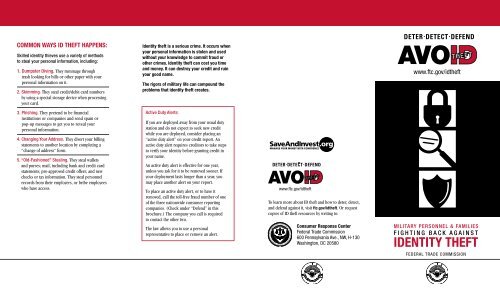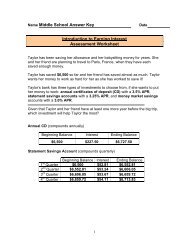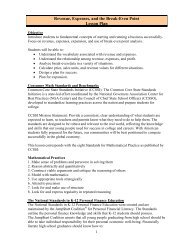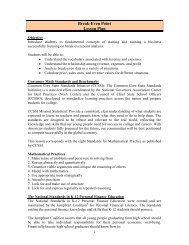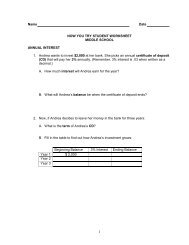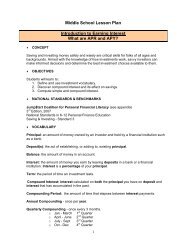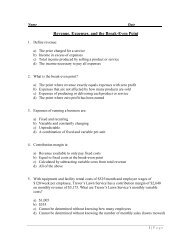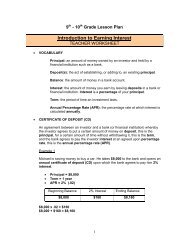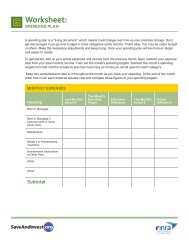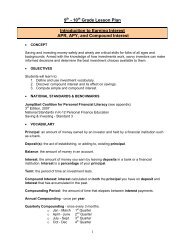Deter. Detect. Defend. Avoid ID Theft. - SaveAndInvest.org
Deter. Detect. Defend. Avoid ID Theft. - SaveAndInvest.org
Deter. Detect. Defend. Avoid ID Theft. - SaveAndInvest.org
Create successful ePaper yourself
Turn your PDF publications into a flip-book with our unique Google optimized e-Paper software.
COMMON WAYS <strong>ID</strong> THEFT HAPPENS:<br />
Skilled identity thieves use a variety of methods<br />
to steal your personal information, including:<br />
1. Dumpster Diving. They rummage through<br />
trash looking for bills or other paper with your<br />
personal information on it.<br />
2. Skimming. They steal credit/debit card numbers<br />
by using a special storage device when processing<br />
your card.<br />
Identity theft is a serious crime. It occurs when<br />
your personal information is stolen and used<br />
without your knowledge to commit fraud or<br />
other crimes. Identity theft can cost you time<br />
and money. It can destroy your credit and ruin<br />
your good name.<br />
The rigors of military life can compound the<br />
problems that identity theft creates.<br />
3. Phishing. They pretend to be financial<br />
institutions or companies and send spam or<br />
pop-up messages to get you to reveal your<br />
personal information.<br />
4. Changing Your Address. They divert your billing<br />
statements to another location by completing a<br />
“change of address” form.<br />
5. “Old-Fashioned” Stealing. They steal wallets<br />
and purses; mail, including bank and credit card<br />
statements; pre-approved credit offers; and new<br />
checks or tax information. They steal personnel<br />
records from their employers, or bribe employees<br />
who have access.<br />
Active Duty Alerts:<br />
If you are deployed away from your usual duty<br />
station and do not expect to seek new credit<br />
while you are deployed, consider placing an<br />
“active duty alert” on your credit report. An<br />
active duty alert requires creditors to take steps<br />
to verify your identity before granting credit in<br />
your name.<br />
An active duty alert is effective for one year,<br />
unless you ask for it to be removed sooner. If<br />
your deployment lasts longer than a year, you<br />
may place another alert on your report.<br />
To place an active duty alert, or to have it<br />
removed, call the toll-free fraud number of one<br />
of the three nationwide consumer reporting<br />
companies. (Check under “<strong>Defend</strong>” in this<br />
brochure.) The company you call is required<br />
to contact the other two.<br />
The law allows you to use a personal<br />
representative to place or remove an alert.<br />
To learn more about <strong>ID</strong> theft and how to deter, detect,<br />
and defend against it, visit ftc.gov/idtheft. Or request<br />
copies of <strong>ID</strong> theft resources by writing to:<br />
Consumer Response Center<br />
Federal Trade Commission<br />
600 Pennsylvania Ave., NW, H-130<br />
Washington, DC 20580<br />
MILITARY PERSONNEL & FAMILIES<br />
Fighting Back Against<br />
Identity <strong>Theft</strong><br />
FEDERAL TRADE COMMISSION
DETER<br />
DETECT<br />
DEFEND<br />
<strong>Deter</strong> identity thieves by safeguarding<br />
your information.<br />
■ Shred financial documents and paperwork with<br />
personal information before you discard them.<br />
■ Protect your Social Security number. Don’t carry<br />
your Social Security card in your wallet or write<br />
your Social Security number on a check. Give<br />
it out only if absolutely necessary or ask to use<br />
another identifier.<br />
■ Don’t give out personal information on the<br />
phone, through the mail, or over the Internet<br />
unless you know who you are dealing with.<br />
■ Safeguard your military <strong>ID</strong>. Keep it with you or<br />
locked up at all times.<br />
■ Never lend your credit cards or account<br />
information to anyone else.<br />
■ Do not click on links sent in unsolicited e-mails;<br />
instead, type in a Web address you know. Use<br />
firewalls, anti-spyware, and anti-virus software<br />
to protect your home computer, and keep them<br />
up to date. Visit OnGuardOnline.gov for more<br />
information.<br />
■ Don’t use an obvious password like your birth<br />
date, your mother’s maiden name, or the last four<br />
digits of your Social Security number.<br />
■ Keep your personal information in a secure<br />
place, especially if you live in barracks or with<br />
roommates.<br />
■ Don't let mail pile up unattended if you can’t<br />
collect it. Use a mail stop or P.O. Box, or have<br />
someone you trust hold your mail while you<br />
are away.<br />
<strong>Detect</strong> suspicious activity by routinely monitoring<br />
your financial accounts and billing statements. If<br />
you are unable to take these steps while you are<br />
deployed, consider placing an “active duty alert”<br />
on your credit report.<br />
Inspect:<br />
■ Your credit report. Credit reports contain<br />
information about you, including what accounts<br />
you have and your bill-paying history.<br />
p The law requires each of the major nationwide<br />
consumer reporting companies—Equifax,<br />
Experian, and TransUnion—to give you a free<br />
copy of your credit report every year if you ask<br />
for it.<br />
p Visit www.AnnualCreditReport.com or call<br />
1-877-322-8228, a service created by these<br />
three companies, to order your free credit<br />
reports each year. You also can write: Annual<br />
Credit Report Request Service, P.O. Box 105281,<br />
Atlanta, GA 30348-5281.<br />
■ Your financial statements. Review your<br />
financial accounts and read your billing statements<br />
regularly, looking for charges you did not make. If<br />
you review financial accounts online from a public<br />
computer, be sure to log off of financial sites<br />
before you end your session.<br />
Be alert to signs that require<br />
immediate attention:<br />
■ Bills that do not arrive as expected<br />
■ Unexpected credit cards or account statements<br />
■ Denials of credit for no apparent reason<br />
■ Calls or letters about purchases you did not make<br />
<strong>Defend</strong> against <strong>ID</strong> theft as soon as you suspect it.<br />
■ Place a “Fraud Alert” on your credit reports,<br />
and review the reports carefully. The alert tells<br />
creditors to follow certain procedures before they<br />
open new accounts in your name or make changes<br />
to your existing accounts. The three nationwide<br />
consumer reporting companies have toll-free<br />
numbers for placing an initial 90-day fraud alert; a<br />
call to one company is sufficient:<br />
p Equifax: 1-800-525-6285<br />
p Experian: 1-888-EXPERIAN (397-3742)<br />
p TransUnion: 1-800-680-7289<br />
Placing a fraud alert entitles you to free copies<br />
of your credit reports. Look for inquiries from<br />
companies you haven’t contacted, accounts you<br />
didn’t open, and debts on your accounts that you<br />
can’t explain.<br />
■ Close accounts. Close any accounts that have<br />
been tampered with or established fraudulently.<br />
p Call the security or fraud departments of each<br />
company where an account was opened or<br />
changed without your okay. Follow up in writing,<br />
with copies of supporting documents.<br />
p Use the <strong>ID</strong> <strong>Theft</strong> Affidavit at ftc.gov/idtheft to<br />
support your written statement.<br />
p Ask for verification that the disputed account<br />
has been closed and the fraudulent debts<br />
discharged.<br />
p Keep copies of documents and records of your<br />
conversations about the theft.<br />
■ Explain the situation to your commanding<br />
officer. You don’t want your C.O. taken by surprise<br />
if contacted by creditors looking to collect on<br />
charges made by the identity thief. You also may<br />
want a referral to a legal assistance office.<br />
■ File a police report. File a report with military<br />
law enforcement and the local police (if you are in<br />
the United States). Their reports will help you with<br />
creditors who may want proof of the crime.<br />
■ Report the theft to the Federal Trade<br />
Commission. Your report helps law enforcement<br />
officials across the United States in their<br />
investigations.<br />
p Online: ftc.gov/idtheft<br />
p By phone: 1-877-<strong>ID</strong>-THEFT (438-4338) or<br />
TTY, 1-866-653-4261<br />
p By mail: Identity <strong>Theft</strong> Clearinghouse, Federal<br />
Trade Commission, Washington, DC 20580<br />
To learn more about <strong>ID</strong> theft and how to deter,<br />
detect, and defend against it, visit ftc.gov/idtheft.<br />
Federal Trade Commission | 600 Pennsylvania Ave., NW Washington, DC 20580 | ftc.gov/idtheft | 1-877-<strong>ID</strong>-THEFT (438-4338)


